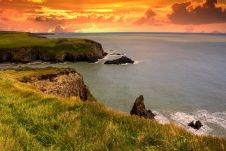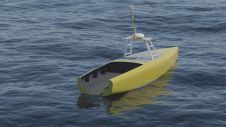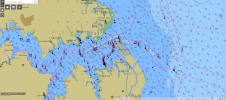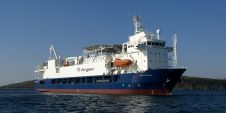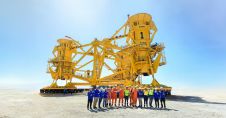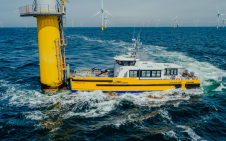Hydrographic Offices and the Commercial World
Interview with Dr Wyn Williams, UK Hydrographer
Hydrographic Offices (HOs) have much more data resting in databases than is used for safety of navigation. This data is increasing required and appreciated for other applications like coastal zone management, private-sector purposes, etc. Meanwhile, in certain countries a policy of ‘retreating government’ leads HOs to (in part) finance their own activities by commercial sale of the data they collect and compile. Another factor forcing HOs to act like private-sector companies is their need for funds to invest in ICT, e.g. for the production of electronic charts. The UK Hydrographic Office (UKHO) provides a good example of these changes, and Dr Wyn Williams, Chief Executive Officer, was willing to be interviewed on the matter.
Please outline for our readers your professional education and how you became involved in hydrography.
I began my career with the Ministry of Defence in 1971 at the Admiralty Surface Weapons establishment near Portsmouth. In 1981 I joined the Royal Navy staff at the British Embassy in Washington DC to be responsible for scientific exchanges between the UK and the USA in all areas of above water warfare. I later became the Assistant Chief of Staff to the Commander in Chief Fleet at Northwood to manage the analysis of all the RN’s operation and exercises. In 1987, I took over management of the UK’s guided weapon test ranges, headquartered on Cardigan Bay.
Promoted to the Senior Civil Service in 1991, I was appointed as Chief Superintendent of the Aircraft and Armament Evaluation Establishment at Boscombe Down, responsible for testing all UK military aircraft and airborne systems. I was appointed Director of Assessment and Evaluation in the Defence Evaluation and Research Agency (DERA) covering aircraft and air systems.
In 1996, I attended the Royal College of Defence Studies in London and in 1997 joined DERA Sea Systems Sector covering all research for the Royal Navy - first as Operations Director, then Technical Director and was then promoted to Sector Director. I was the UK’s Scientific Representative to NATO’s Undersea Research Centre at La Spezia, Italy and a member of the UK’s Foresight Marine Panel.
I took up my current occupation in 2001. My tenure as CEO of this remarkable organisation has been rewarding and fascinating. I have enjoyed excellent relationships with many colleagues in the IHO with whom I look forward to realising the reforms we have initiated and I have led the UKHO through a programme of fundamental change in order to maintain our role in discharging the UK Government responsibility under SOLAS, while positioning the organisation to meet the needs of the mariner in the rapidly evolving digital era.
Your office is noted for its determined marketing policy in recent years. Do you think this will distract the office from its provision of a government service towards safety of shipping?
No, our contribution to the safety of shipping remains paramount.
We live in a constantly evolving era, in which the UKHO needs to be able to provide electronic products and services of the same quality for which it has always been known in a fiercely competitive marketplace. The UK government stipulates that the UKHO is self funding. Unless the UKHO remains a key player in the market, the products and services which are so valued and relied upon by world shipping could degrade and many of our services could eventually disappear.
One of the UK Hydrographic Office’s primary aims is to provide hydrographic products and services that meet the needs of SOLAS vessels. This is the foundation on which the UKHO stands, and safety will not be compromised by our commercial activities.
Are there procedures in place, and what sort of precautions have been taken to safeguard the quality of hydrographic publications?
The safety of the mariner is at the heart of everything we do. As you would expect, in addition to the normal and highly extensive production safety and quality controls, there are a number of additional independent monitoring bodies both external and internal set up specifically to monitor, enhance and maintain our stringent standards. These include our Safety of Navigation Assurance Committee (SONAC) and Product Safety Management Board (PSMB).
UKHO is at present involved in several private-sector enterprises, and there are indications that ‘Taunton’ is looking for ways to make money on the data available in the databases (SeaZone). Please tell our readers something of why this change is taking place.
Hydrographic information is not only of value to mariners and surveyors. Various non-navigational organisations such as public bodies and individuals require access to specialist datasets which are enriched by the data we hold. The UKHO is at the centre of considerable activity to bring together as many suppliers of such information in order to simplify provision and interoperability of datasets, making it easier to source and easier to use. SeaZone Solutions Ltd is key in this process since its principle service is a unique ability to integrate a large variety of software packages, creating seamless datasets which can be used across multiple IT systems. We see this as a positive step forward to widening access and flexibility to those who can benefit from our data outside of the normal navigation markets.
Is UKHO considering extending its services, and will it finally become a fully private enterprise?
As we have indicated following extensive research into the needs and issues of the mariner, it is the intention of the UKHO to position itself as a customer-led organisation. This is entirely consistent with our mission and aims which are to extract maximum value from UKHO capabilities by providing customers with readily accessible and the highest quality hydrographic information and services.
Whether the UKHO would ever become a private enterprise is entirely in the hands of the government of the day. However, in 2002 the UKHO underwent an external review which examined the trading position of the organisation. The review found that the most appropriate and internationally acceptable option was for the hydrographic office to remain a government organisation. A key element which was considered in reaching this conclusion was the views expressed by our hydrographic peers worldwide. This will remain a key concern whenever such a review is carried out.
Some see this involvement of UKHO as an example of good co-operation between the private and public sector. For others it means ‘unfair competition’, since public funds are used for commercial purposes. Could you elaborate on these contradictions? For instance, when selling, is price setting based on real costs or is it just a ‘nice extra’, so that a lower (and very competitive) price can be set?
Pricing of all Admiralty products is determined on a cost recovery model over a realistic period of time. As you would expect, this takes into account development costs and through-life maintenance.
I regard ‘unfair competition’ as a wholly inaccurate description. Resourcing the continued development of products and services is simply good business practice aimed at improving the safety and quality of the offering. In the case of the UKHO, development resource is not public money – we are, as I mentioned earlier, a wholly self funding body.
What are your general views on closer co-operation between industry and the public hydrographic organisations?
There is great value both to the mariner and to wider non-navigational sectors in bringing industry and HOs together and maximising the potential both have to offer. Perhaps a closer degree of co-operation several years ago might have yielded easier manufacture and greater take-up of ECDISs and ENCs by now.
Is there a relationship between the nomination of civilian CEOs in the UKHO and embarking upon commercial activities?
Looking back through the UKHO’s great history, every Hydrographer has been selected and proved highly effective for the environment into which they have been recruited. My most recent predecessors have been no exception and were responsible for creating the infrastructure upon which we have built what we are today.
You were very much involved with the IHO Strategic Planning Working Group. You must have been pleased to see approval of the restructuring of the management system of the IHO.
I am delighted with the work which has been carried out by the SPWG and very much hope to see the reforms reach fruition. The Extraordinary Conference in Monaco in April carried the change proposals with huge majorities, and our task now is to convince all the participating Governments to ratify the change processes as quickly as possible, through the IHO’s normal voting procedures.
There have been suggestions in the past that national HOs within Europe should combine to form a single European HO. In view of the development of the UK-based Electronic Chart Centre and its recent stronger ties with PRIMAR, do you see this integration as a model for more general co-operation in charting?
A seamless global ENC service will only be realised through total and genuine international co-operation, and the UKHO has recently been engaged in an international partnering programme to try and achieve exactly that. The global hydrographic community shares the same goal, which is to protect the mariner, and similar calls for cooperation have resounded worldwide. International cooperation is getting better all the time - which is good news for the mariner.
Do you have any particular message for our readers, for the hydrographic community in general or for any part of it?
My message at the moment is to our friends and colleagues in and around the Louisiana and Mississippi Gulf coast. Like everybody, I was shocked to learn of the impact and devastation caused by Hurricane Katrina. It is hard to imagine what they must all be experiencing but I know I speak for all of their friends and colleagues at the UK Hydrographic Office, and HOs around the world, when I say how very sad and sorry we all are.
Our thoughts and prayers are with all of them at this time, particularly to those who have lost family, homes and livelihoods. We send our warmest wishes and hopes that the recovery operations currently underway are carried out as swiftly as possible.

Value staying current with hydrography?
Stay on the map with our expertly curated newsletters.
We provide educational insights, industry updates, and inspiring stories from the world of hydrography to help you learn, grow, and navigate your field with confidence. Don't miss out - subscribe today and ensure you're always informed, educated, and inspired by the latest in hydrographic technology and research.
Choose your newsletter(s)

